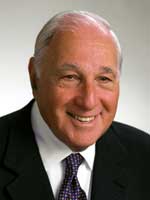Corporate Contributions to Education - Part I
This Is The First In A Series On Corporate Contributions
To Education,
Interviewing Leaders Who Have Changed The Face Of Education In Our Nation

Daniel Rose, CEO, Rose Associates
Focuses on Harlem Educational Activities Fund
by Joan
Baum, Ph.D.
So what does a super-dynamic,
impassioned, articulate humanitarian from a well known
philanthropic family do when he becomes Chairman Emeritus,
after having founded and funded a significant venture
for educational reform? If he’s Daniel Rose, of Rose Associates, Inc.,
he’s “bursting with pride” at having
a distinguished new team to whom he has passed the torch—Chair
Stephen L. Gessner and Vice Chair Fern J. Khan—but
he continues to talk about the Harlem Educational Activities
Fund, Inc (HEAF) with so much energy and fervor that
it’s clear that he’ll be stoking the flame
constantly to ensure that it’s always burning bright.
Metaphors naturally describe
the activities that intrigue Dan Rose, a visionary
who instinctively invokes his own similes and metaphors
to describe HEAF, an after-school, weekend and summer
program. Noting that it’s the
smallest of the rocket models at Cape Kennedy that makes
it to the moon, he analogizes that reach to the success
of HEAF, a relatively small operation in the world of
private and public funding of educational initiatives
for disadvantaged minorities. Pause (only a slight one).
Dan Rose is overflowing with enthusiasm. His family has
always been involved in supporting culture and the arts
and HEAF, he says, is his way of continuing this tradition
and also of giving back. A Yale man, he expresses a great
commitment to public education, noting that the 1937
graduating class of The City College went on to produce
three Nobelists—and that at a time when students
were largely from immigrant communities, living in tough
neighborhoods and finding themselves in overcrowded classrooms.
Of course, Rose is a realist: He knows that the areas
HEAF serves—Central Harlem, Washington Heights,
the South Bronx—are rife with conditions that all
too easily breed negative peer pressure, poor self-esteem,
and low aspirations and expectations that inevitably
produce low achievement. HEAF’s mission is the
direct opposite.
To the mother of a HEAF student
in his office some years ago, for whom he had just
purchased a bonsai, he spoke of the difference between
the small tree whose limited growth was conditioned
by its narrow root system, and the giant Sequoia, whose
reach to the sky was due to its rich and supportive
external conditions. He spoke of HEAF providing that
kind of environment so that her child would grow to
full potential. The son went on to the Bronx H.S. of
Science and eventually to the Albert Einstein Medical
School where he is completing his residency in pediatrics.
Other students recount similar stories on video at
HEAF’s website—a Yale sophomore,
whose Dominican mother didn’t know about the university,
a Columbia Journalism major whom HEAF coaxed out of shyness,
and so on.
So what is it that sets HEAF
apart? Research and development. Beginning 15 years
ago with an experiment to see what truly worked, HEAF
wound up concentrating on “being
effective at the margin.” First HEAF took under
its wing the lowest-ranking public school in the city
and five years later moved it from having only 9 percent
of its students at grade level to 2/3rds. Then HEAF turned
its attention to a minority school with 100 percent at
or above grade level but whose students were not successful
in getting into the city’s premier public high
schools. HEAF tutoring and counseling turned that around,
and the school went on to generate the number-one student
chess players in the country. Still, with success at
both ends, “the sad reality” was that students
from the low-scoring school did not continue to achieve
after graduation. The other finding was that students
from the high-achieving school would have produced successes
regardless of HEAF. Thus was born The Margin, the HEAF
niche—“the best use of limited resources”—working
with motivated children who might not make it without
HEAF but who, with HEAF support, most likely would.
“Focus on what you can do” may be a kind
of “triage,” but HEAF has proved that raising
expectations and therefore performance can be done. Rose
is still joyously recovering from a visit he just made
with 12 students to visit Federal Judge Robert Katzman
in his chambers at the U.S. Federal District Thurgood
Marshall Courthouse. The kids tried on the judge’s
robes and listened in rapt attention to career possibilities.
No one could have been more thrilled, however, than Dan
Rose.#
See www.heaf.org.
